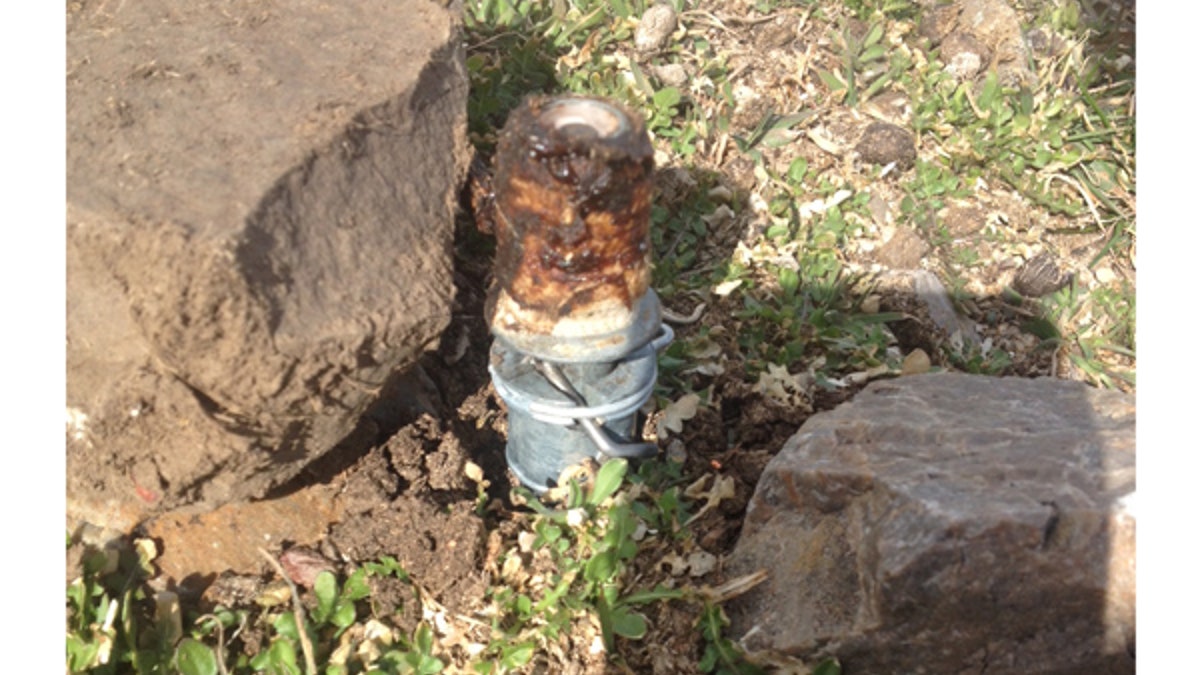
This photo shows the M-44 that killed the Mansfield family's 3-year-old dog in Pocatello, Idaho. (The Bannock County Sheriff's Office)
As was their routine, 14-year-old Canyon Mansfield and his dog raced through the backyard of his Idaho home and up the top of a nearby hill to play. Minutes later, Canyon was knocked to the ground after a cyanide bomb set by the U.S. government detonated some 350 yards from the family's doorstep.
Canyon watched as his 3-year-old golden Labrador, Casey, lay dying, suffocating from orange-colored cyanide sprayed by an M-44 device no one had told Canyon's family about.

Canyon Mansfield, left, with his dog, Casey.
"We are devastated," the boy's mother, Theresa Mansfield, of Pocatello, Idaho, told Fox News on Tuesday. "My dog died in less than 2 minutes. My son was rushed to the hospital covered in cyanide."
"We had no idea they were there," Mansfield said of the device, which she described as resembling a sprinkler head.
The dog's death on Thursday follows a string of other recent incidents in which family pets were accidentally killed by M-44s, a controversial device used by Wildlife Services, a little-known branch of the U.S. Department of Agriculture tasked with destroying animals seen as threats to people, agriculture and the environment.
Critics, including Rep. Peter DeFazio, D-Ore., say the government’s taxpayer-funded Predator Control program and its killing methods are random -- and at times, illegal.
"The recent death of dogs in Idaho and Wyoming are the latest unnecessary tragedies of USDA’s Wildlife Services use of M-44 cyanide traps,” DeFazio told Fox News. “These deadly traps have killed scores of domestic animals, and sooner or later, they will kill a human."
"It’s time to stop subsidizing ranchers’ livestock protection efforts with taxpayer dollars and end the unchecked authority of Wildlife Services once and for all," he said.
DeFazio's office said the lawmaker plans to reintroduce a House bill this week that, if passed into law, would ban the use of the devices for predator control.
“These deadly traps have killed scores of domestic animals, and sooner or later, they will kill a human."
The Bannock County Sheriff's Office responded to the Mansfield’s home on Thursday with a bomb squad to investigate the incident. The family was immediately sent to a local emergency room to be screened for cyanide exposure.
The government claims the devices are not capable of killing a child. But Idaho authorities do not agree in the case of Canyon Mansfield, who weighs only 20 pounds more than his 80-pound dog.

(Canyon Mansfield holds his dog's collar near where the 3-year-old Labrador was killed on Thursday.)
"He's very lucky to be alive," Capt. Dan Argyle of the Bannock County Sheriff's Office said of Canyon, whose blood is still being checked for levels of cyanide.
"We're still trying to figure out how he wasn't affected," Argyle told Fox News. "We think a strong wind blew it [the cyanide] downhill when the device went off -- right in the dog's direction."
Argyle said Wildlife Services is required by law to post warning signs around the devices but said, "We did not observe any signs at the location." Upon further inspection, authorities found a second device within yards of the Mansfield home. Both devices were planted in the ground on Feb. 25 without the family's knowledge or consent.
Days earlier, a family walking in an area 52 miles northwest of Casper, Wyo., lost two dogs from an M-44 that detonated near a hiking trail they have walked for 20 years.
Amy Helfrieck said she heard her husband yelling on March 12 as she was antler hunting with her 8-year-old daughter, sister and brother-in-law in a prairie filled with cedar trees and rock outcroppings.
When she turned her head, Helfrieck saw her husband carrying the couple's dog, Abby, a 15-year-old Drahthaar -- a breed similar to a German wire-haired dog -- down a hill.
Helfrieck, a nurse, tried to pry open the dog's mouth.
"She was having a lot of difficulty breathing and I knew at that time she was dying," she said.
"What I didn't realize was that we were exposing ourselves to a very deady poison," Helfrieck said.

Helfrieck's 8-year-old daughter holds a photo of the family's dog, Abby, killed March 12 by an M-44 in Wyoming.
Her sister's 7-year-old Weimaraner, Molly, also was killed by the sodium cyanide trap.
In this case, Helfrieck said there were markers at the site but they were placed only 5 feet from the actual trap.
The M-44s, also known as "coyote-getters," are designed to lure animals with a smelly bait. When an animal tugs on the device, a spring-loaded metal cylinder fires sodium cyanide powder into its mouth.
Over the years, thousands of non-target animals -- wild and domestic -- have been mistakenly killed by the lethal devices.
On Saturday, The Oregonian reported that a gray wolf was accidentally killed by an M-44 on private land in Oregon's Wallowa County. The wolf death was the first documented "incidental take" of its kind in the state involving a protected animal and an M-44, fish and wildlife officials told the newspaper.
Wildlife Services said it first learned of the Wyoming incident on Monday and denied any involvement in the deaths.
Lyndsay Cole, a spokeswoman for the USDA Animal and Plant Health Inspection Service, told Fox News the agency does not conduct predator control using those devices in Natrona County, where the incident occurred.
Cole, however, did confirm the "unintentional lethal take" of the Mansfield family dog in Idaho.
"As a program made up of individual employees, many of whom are pet owners, Wildlife Services understands the close bonds between people and their pets and sincerely regrets such losses," she said, noting that the agency was "very concerned" about any human exposure to the sodium cyanide.
"Wildlife Services has removed M-44s from that area, and is completing a thorough review of the circumstances of this incident," she said.
Cole called the accidental death of family pets from M-44s a "rare occurrence," and said Wildlife Services posts signs and issues other warnings to alert pet owners when traps are placed near their homes. She also said these devices "are only set at the request of and with permission from property owners or managers."
The Mansfields and other familes, however, said they had no knowledge the devices were anywhere near their homes and were not familiar with how they work.
Brooks Fahy, executive director of the national wildlife advocacy organization Predator Defense, has been working for decades to ban M-44s, calling them "nothing more than land mines waiting to go off, no matter if their victim is a child, a dog or a wolf."
"Much of the public remains totally in the dark about the fact that these deadly devices are placed on private and public lands nationwide," Fahy told Fox News. "M-44s are totally indiscriminate. Worse yet, they are unnecessary, as the majority of the animals killed have never preyed on livestock."

